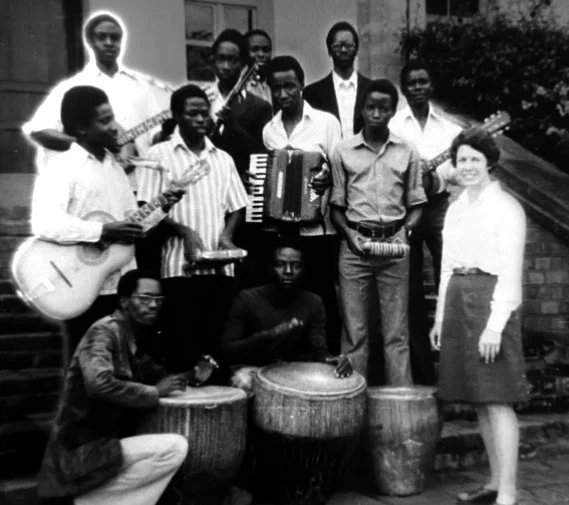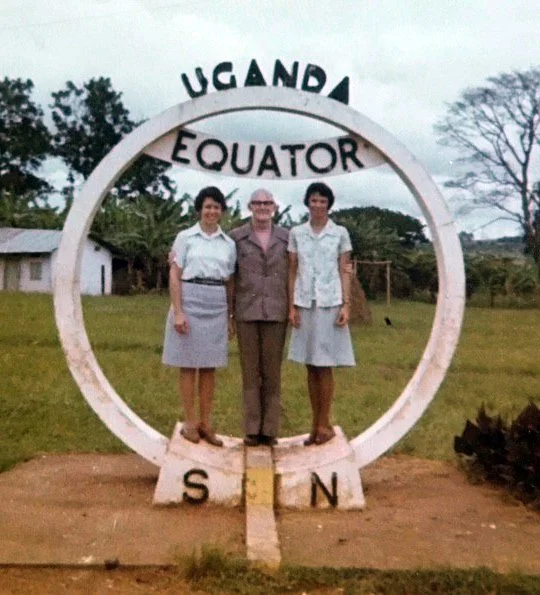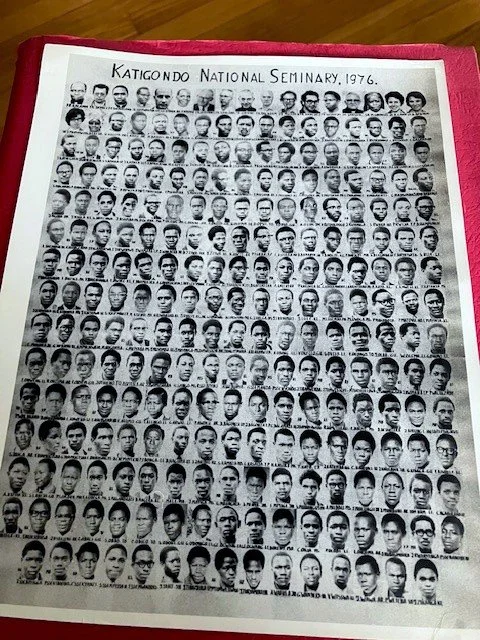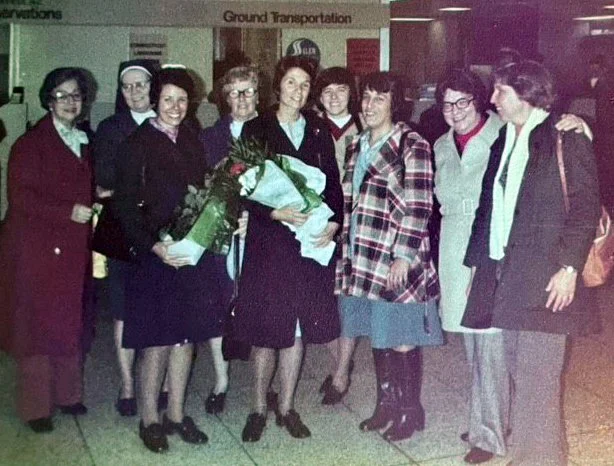Uganda Revisited
July 16, 1975, Uganda, Africa
Fifty Years Ago
Half a century ago, the journey to Uganda began. On July 16, 1975, the feast of Our Lady of Mount Carmel, Genevieve Datchuck, DW, and I boarded the TWA plane to Paris. This was our first stop before Rome on the way to Uganda.
The visit to the Daughters of Wisdom at Rue de la Tombe-Issoire was very welcoming. The sisters took us to Notre Dame Cathedral on a scenic boat ride on Le Bateaux Mouche—everything was so eye-opening for us.
A music group of seminarians at Katigondo Seminary. In her free time, Sr. Rosemarie taught piano to students who were interested.
During our visit to Paris, we had lunch on the second floor of a pizza place with large windows facing the street. Little did we know that the Tour de France was in progress. All of a sudden, everyone rose and rushed to the window—the bikers were passing! This really showed our lack of awareness of Parisian popular culture!
In a few days, we flew to Rome and were met by Sr. Margaret Quigley, DW. We stayed at our Generalate house in Rome for a few days and were taken on a tour of significant sites: the catacombs, Vatican City, fountains, basilicas, and an audience with Pope Paul VI.
Finally, our night flight from Rome to Entebbe, Uganda, awaited us in August. The White Fathers / Missionaries of Africa in Uganda met us and drove us to Katigondo Seminary. From that moment, a new world opened up to us: teaching young seminarians from 14 tribes, living in a country with a dictator leader, Idi Amin, (who sometimes put the people under house arrest, where you could not leave your area), having mail inspected by the government, hearing about the Entebbe raid unfold, and, especially, experiencing the joy of living among the Buganda people and with the international seminary staff, which included Dutch Montfort Father Terstroet. We shared many new experiences of culture, food, language, place, worship, and recreation.
We returned home in December 1977 since Americans were not permitted back in Uganda for several months.
This 50th anniversary sparked these memories. Deo gratias!
Sr. Rosemarie Greco, DW
July 2025
Litchfield, CT
Uganda Revisited
Sr. Rosemarie Greco looks back over 50 years to her ministry as an instructor of church history at Katigondo Seminary in Uganda and Makerere University in Kampala from July 1975 to December 1977.
How it all came about:
Fr. Lambertus Terstroet, SMM, from the Dutch Province, invited Sr. Rosemarie Greco, DW, and Sr. Genevieve Datchuck, DW, to join him in Uganda to teach at the seminary due to a shortage of scripture and church history teachers. Sr. Rosemarie said, "At first, I was engaged in my ministry as the Coordinator of Adult Education for the Diocese of Rockville Center and Sr. Genevieve was the Director of Religious Education at St. Hugh of Lincoln Church in Huntington Station, NY, but a year later, when the call came again, we were prepared."
Sr. Rosemarie Greco, Fr. Lambertus Terstroet, SMM (Dutch Province), Sr. Genevieve Datchuck in local dress for a feast day. Sr. Rosemarie said, “The Ugandan martyrs' feast day was a huge celebration.”
When asked about her initial expectations and how they compared to her actual experiences, she shared the following:
"I was expecting to take malaria pills weekly, a place to live (under the German Embassy), books and a library, and living near the White Sisters (Missionary Sisters of Our Lady of Africa) who had a hospital and community nearby and speaking English the official language for government and education." She got all that, but she experienced a lot more.
Upon her arrival, she discovered a few new realities. "Snakes and geckos could easily get into your room and shoes. A stick was kept at the door for use as needed. An outhouse and shower were outside, but you didn't want to use them at night. You never knew what or who you might encounter.
The news was the 'Voice of Uganda,' which was basically the voice of Idi Amin in print and on the radio. We could have a radio to get news from the Voice of America.
Only four religions were permitted: Anglican, Roman Catholic, Muslim, and traditional religion. When an Anglican archbishop was assassinated, fear went through all of us. Our skirts had to be below the knee; anything higher was considered obscene. When American films were shown, the students went wild if people kissed. You don't kiss in public!
We "expatriates" could get weekly rations at Kampala, the capital. I frequently went with the German brother on staff, and we bought as much as possible for the seminary. Scarce items were oil, soap, rice, bread, and canned goods from England or Germany. You never knew what was available. The basic food at all meals was mashed bananas (matoke) and peanut sauce. During other times, fried locusts and animal entrails were on the table. There were many varieties of bananas. Sugar cane was abundant along the roadsides. Breakfast usually had eggs and coffee. Local women cooked for the seminary. One day, we walked into the "kitchen" to see what it was like. We came across a dead cow being prepared for a meal with small animals gnawing on it. We never went into the kitchen again! We learned how to eat with people in the village. The left hand was to touch things. The right hand was to touch food. There were no utensils."
Sr. Rosemarie Greco, Fr. Lambertus Terstroet, and Sr. Genevieve Datchuck at the equator in Uganda.
Sr. Rosemarie Greco, Fr. Sanchez, White Fathers Missionaries of Africa, Idi Amin, Fr. Lambertus Terstroet, Sr. Genevieve Datchuck, and 6 of Amin's children. While having tea at the Kampala hotel, a plane landed with Amin. A photo was taken for the newspaper, describing tourists from Europe. Sr. Rosemarie said, “It was actually a bit frightening.”
1976 Students enrolled in Katigondo National Seminary in Uganda, where Sr. Rosemarie taught. One of them, Anthony Zziwa, is now a Bishop in Uganda. He also taught Sr. Rosemarie how to play tennis.
Family and Daughters of Wisdom welcomed the Sisters home at JFK airport, New York, in December 1977. After a school vacation in 1977, Sr. Rosemarie said, “Many of us went to Nairobi, and we learned that Americans might not get back into Uganda. That made us decide to leave the country. Others who went to Kenya couldn’t return to Uganda for several months.”






